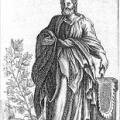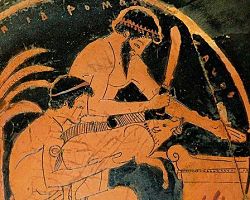94 - The Platonic Successor: Proclus
Proclus’ system, presented in original works and in commentaries on Plato and Euclid, integrates Neoplatonic philosophy with pagan religious belief and practice.
Themes:
• W. Beierwaltes, Proklos: Grundzüge seiner Metaphysik (Frankfurt am Main: 1965).
• R. Chlup, Proclus: An Introduction (Cambridge: Cambridge University Press, 2012).
• P. d'Hoine and M. Martijn, All from One: a Guide to Proclus (Oxford: 2016).
• E.R. Dodds, Proclus: The Elements of Theology (Oxford: 1933).
• S. Gersh, Kinesis Akinetos: a Study of Spiritual Motion in the Philosophy of Proclus (Leiden: 1973).
• C. Helmig, Forms and Concepts. Concept Formation in the Platonic Tradition (Berlin: de Gruyter, 2012).
• J. Opsomer and C. Steel (trans.), Proclus: On the Existence of Evils (London: 2003).
• J. Opsomer, “Proclus vs Plotinus on matter (De mal. subs. 30–7),” Phronesis 46 (2001), 154-88.
• M. Martijn, Proclus on Nature (Leiden: 2010).
• M. Perkams and R.M. Piccione (eds), Proklos. Methode, Seelenlehre, Metaphysik (Leiden: 2006).
• L. Siorvanes, Proclus: Neo-Platonic Philosophy and Science (New Haven: 1996).
• C. Steel, “Breathing thought. Proclus on the innate knowledge of the soul,” in The Perennial Tradition of Neoplatonism, ed. J. Cleary (Leuven: 1997), 293–309.







Comments
Proclus and Plotinus
Hi Peter,
I listened to your podcast on Proclus a couple of times but still would like some help on the distinctions made by Gnostics, Plotinus and Proclus on the existence of evil. My understanding, stated in brief, is:
The Gnostics think matter itself is evil
Plotinus thinks matter isn’t evil but is the cause of evil
Proclus thinks matter is good but matter in conflict can result in evil
The Gnostic view is clear and clean-cut. Is there a clearer, more complete way of understanding the difference between Plotinus and Proclus? Conflict seems to be simply a fancy way of saying cause.
Thanks.
Glenn
In reply to Proclus and Plotinus by Glenn Russell
Neoplatonists on evil
Hi Glenn,
That's a very good summary. The difference between Plotinus and Proclus is, as you say, that for Proclus matter is in a sense actually good because it has a potentiality to take on form and thus cooperate in the realization of the good. Whereas Plotinus thinks that matter cannot ever take on form, it remains "dead" and inert underneath form and is not actualized. So its only contribution is to impede the realization of form (not directly, since it is too featureless actively to oppose the good as the Gnostics think -- but insofar as form will be less perfectly realized once it appears as "decoration" on the "corpse" of matter). Proclus by contrast thinks that matter gives rise to evil by making it possible for various goods to come into conflict, which cannot happen in the intelligible realm.
Does that help?
Peter
In reply to Neoplatonists on evil by Peter Adamson
Thanks --
Thanks for your clarification, Peter. Apologies for taking a year and a half to say thanks and your post does indeed help. -- I missed your reply back then.
In reply to Thanks -- by Glenn Russell
You're welcome
Better late than never! And thanks for the other post about music and yoga on episode 133.
Intellective gods
Hi Peter,
First of all, thank you for a somewhat more accessible companion to this subject than battling through the Elements of Theology by oneself.
You mention in the podcast the use of a triumverate of classes of Gods to ensure, without gaps, an account of intellect (nous?). That is: Intelligible gods - intelligible/intellective gods - intellective gods.
My question is, is it only the 'lowest' class of gods who Proclus equates with the traditional Hellenic Pantheon (the intelligible gods being of a higher, unknowable, order); or, are some deities of the pantheon intelligible gods, some intelligible/intellective and finally some intellective (e.g. Zeus being of a higher order than, say, Hestia)?
Please correct me if any of the context of my question is misunderstood.
So Many P Names
So the big names in this section are....
Pythagoras, Plato, Philo, Plutarch, Plotinus, Porphyry, Proclus, and Philoponus. I have a feeling i'm gonna get a few of them confused with each other in a couple of years.
In reply to So Many P Names by Alexander Johnson
P Names
I always tell people that the best philosophers begin with P (the ones you named) or A (Aristotle, Avicenna, Aquinas...).
Then I remind them what my initials are!
In reply to P Names by Peter Adamson
Logic
Sorry to say this, but you are actually suggesting a logical error: You first say "If somebody is a great philosopher, then his name begins with P or A." But the converse does not need to be true. Therefore you cannot conclude that someone whose initials are P.A. is necessarily a great philosopher (though you might ague that it slightly increases the probability). And of course the premise is dubious, at the very least.
Yes I know, you don't mean it... Or do you?
In reply to Logic by S.G.
Knowing your Ps and As
That's an excellent point. The premise does however mean that I am a candidate for being a great philosopher, since if my initials were not P and/or A, then I would already be ruled out. You know, like David Hume and Immanuel Kant.
In reply to Knowing your Ps and As by Peter Adamson
A challenger
Considering Hesiod, Homer, Heraclitus, Hobbes, Hume, Yehuda Helevi, Hui Tzi, Hegel, Husserl, and Heidegger maybe the H has a pedigree too...
the great chain of being
You don't mention that phrase in your great podcasts on the neo-Platonists, but I take it that you're discussing the idea of it here and in the previous podcast. I suppose that the phrase was invented later. Right?
In reply to the great chain of being by Steve
Great chain of being
That's right, I associate the phrase with Arthur Lovejoy though I couldn't swear that he invented it. There is also a famous passage in Homer about the world being hung from a chain down from Zeus, or something to that effect. Anyway you are right that I didn't mention it since it is not a phrase used by the Neoplatonists themselves but it is often used to describe their view.
Proclus resource
The Proclus page and others in my Open Access pdf LOGIC GALLERY which will of interest. It is a century by century panorama of a fundamental concept, with a separate full page for 178 figures since Aristotle. Each has quotations, a bio screed, several seldom seen illustrations, and links for further study. Included are several dozen Ancients/Neoplatonists/Moslems/Medievals.
The free download is at http://humbox.ac.uk/5497/
It takes about 2 minutes, so be patient.
PS: It is notable that the topic of first book published by an American was Neoplatonism.
Add new comment